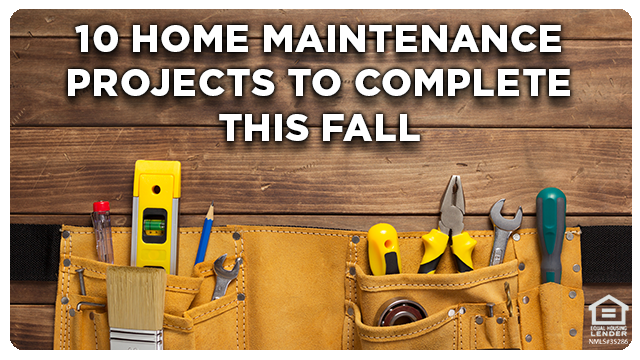10 Home Maintenance Projects to Complete This Fall
Blog:10 Home Maintenance Projects to Complete This Fall

Posted on
As the days grow shorter and the air turns crisp, fall is the perfect time to prepare your home for the colder months ahead. Taking a proactive approach to home maintenance not only enhances your comfort but also helps prevent costly repairs in the future.
From checking your heating system to winterizing your yard, a few simple tasks can make a world of difference. Here’s a comprehensive checklist to guide you through your fall home maintenance routine.
1. Inspect and Clean Your Gutters
Why It Matters: Clogged gutters can cause water to back up, leading to roof damage and ice dams during winter.
What to Do: Remove leaves, twigs, and other debris from gutters and downspouts. After cleaning, run water through them to ensure proper drainage.
Pro Tip: Installing gutter guards can help minimize debris buildup in the future.
2. Check Your Roof
Why It Matters: A damaged roof can lead to leaks and significant repair costs.
What to Do: Inspect for missing or damaged shingles, and check for signs of wear around vents and chimneys.
3. Service Your Heating System
Why It Matters: Ensuring your heating system is in good working order will keep your home comfortable and efficient.
What to Do: Replace air filters and schedule a professional inspection for your furnace or boiler. Don’t forget to check your thermostat settings!
Bonus Tip: If you have a fireplace, arrange for a cleaning and inspection to prevent chimney fires and ensure safe operation.
4. Seal Windows and Doors
Why It Matters: Drafty windows and doors can lead to increased energy bills and a chilly home.
What to Do: Inspect for gaps or cracks and apply weather stripping or caulk where necessary.
Pro Tip: Use a candle or incense stick to detect drafts—if the flame flickers, you’ve found a leak!
5. Prepare Your Yard
Why It Matters: A well-maintained yard can prevent problems like mold and flooding when snow melts.
What to Do: Rake leaves, trim overgrown branches, and clean up any garden debris. Aerate your lawn and consider applying a winter fertilizer to strengthen roots for spring.
Bonus Tip: Consider composting leaves instead of bagging them; they can enrich your garden soil.
6. Insulate Your Pipes
Why It Matters: Frozen pipes can burst and cause extensive water damage.
What to Do: Insulate exposed pipes, especially in unheated areas like basements, attics, and garages. For extremely cold climates, consider using heat tape to provide additional warmth to vulnerable pipes.
7. Test Your Smoke and Carbon Monoxide Detectors
Why It Matters: Proper functioning detectors are crucial for your family’s safety, especially with increased heating in winter.
What to Do: Replace batteries and test all detectors to ensure they are operational.
Upgrade Option: Consider installing smart detectors that can send alerts to your phone if something is wrong.
8. Store Outdoor Furniture
Why It Matters: Protecting outdoor items can extend their lifespan and save you money in the long run.
What to Do: Clean all patio furniture and cushions and store them indoors if possible. If indoor storage isn’t an option, use weather-resistant covers to help protect them from the elements.
9. Check Your Sump Pump
Why It Matters: A functioning sump pump is essential for preventing basement flooding during heavy rains or snowmelt.
What to Do: Test the pump to ensure it activates and drains water properly. Clean the sump pit of any debris that could obstruct the pump.
10. Review Your Emergency Kits
Why It Matters: Being prepared for severe weather can keep your family safe and secure.
What to Do: Check your emergency supplies, including flashlights, batteries, non-perishable food, and water. Ensure your first aid kit is stocked with essentials, and consider adding items specific to your family’s needs.